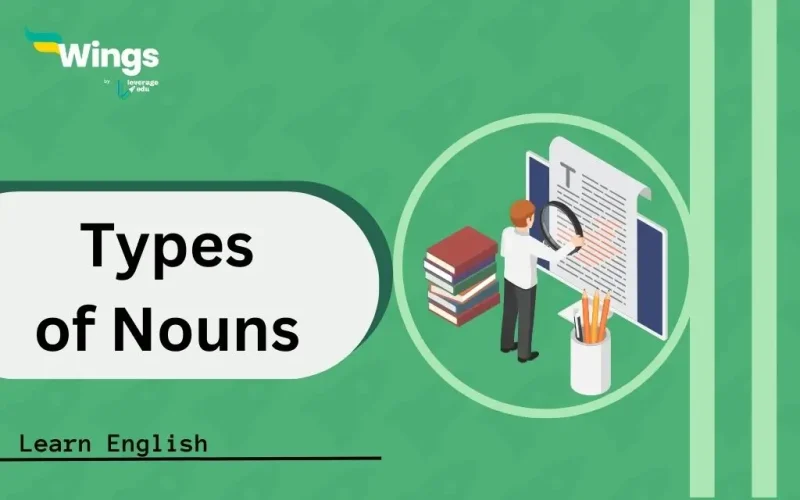Nouns are words that represent a person, concept, thing or place. Most sentences contain at least one noun. In layman’s words, anything that we can touch, smell, see, hear or hold is known as a noun. With more than 8 types of nouns, they constitute the main parts of speech in the English vocabulary. Moreover, they are also introduced by articles such as a, an, or the. To know more about them, we have compiled a detailed blog on types of nouns.
This Blog Includes:
Also Read: Determiners in English Grammar: Definition, Type & Rules
What is a Noun?
As discussed above, nouns are an integral part of the English language. They are used in naming people, places, animals, ideas and objects. Some common examples of nouns include dog, Sam, phone, hunger, Chicago and several others. As there are several types of nouns, each one of them plays its role when used in a sentence. Lastly, they can also act as adjectives and verbs.
Interestingly, nouns are also called naming words and are probably the first part of the speech.
Examples of Nouns
As mentioned above, nouns can be subcategorised into several categories. This ranges from people, ideas, objects, etc. Here are some commonly used nouns that are used in sentences.
| People | Seema, Sheela, Rahul, Women, Girl, The President, The Prime Minister |
| Place | Bangalore, Malaysia, Mysore, Bedroom, Kitchen, Cricket Ground, Swimming Pool |
| Objects/Things | Bat, Hat, Knife, Cycle, Paper, Bag, Bottle, Tissue Paper |
| Ideas | Invention, Discovery, Destruction, Argument, Evolution |
| Animals/Birds/Reptiles etc. | Lion, Zebra, Snake, Bear, Fish, Parrot, Crocodile |
Also Read: Nouns: Definition, Examples
What are the 8 Types of Nouns?
Nouns can be classified into the following categories. Let’s learn about them one by one
- Proper Nouns
- Common Nouns
- Plural Nouns
- Singular Nouns
- Countable Nouns
- Uncountable Nouns
- Collective Nouns
- Abstract Nouns
1. Proper Nouns
Proper Nouns have two distinct features: they name specific one-of-a-kind items and they begin with capital letters. This applies to all proper nouns no matter where they are used in a sentence.
Examples:
- Prakash, Seema, Raj, Andrew
- London, Chicago, the USA, Massachusetts, Paris
- Google, Amazon, Deloitte, Flipkart
- The Democratic Party, Congress
2. Common Nouns
Unlike proper nouns, they are not used in naming a specific person, place or thing. On the contrary, these are suitable for a generic group, item or place. They do not begin with capitalized letters unless they are placed at the beginning of the sentence.
Example:
- Fork
- Goat
- Dove
- Dog
- Cat
- Water Bottle
- Child
Also Read: Common Noun: Definition, Examples
3. Plural Nouns
These nouns address numerous or several people, places or things. Nouns become plural by adding ‘s’, ‘es’, ‘ies’ or ‘ves’ at the end of the word. However, in cases where the nouns end with ‘s’ the word remains the same. As always, there are exceptions where some nouns do not change matter they are singular or plural nouns.
Example:
- Boats
- Houses
- Cats
- Horses
Read More: Plural Nouns: Definition, Rules, Examples & Exercises
4. Singular Nouns
These nouns are used to name a single object, place, person, bird or animal. This type of noun is quite easy to understand. Countable nouns and uncountable nouns come under this category.
Example:
- Pen
- Chalk
- Slate
- Blackboard
- Pigeon
- Game
Read More: What are Singular Nouns?
5. Countable Nouns
They are those nouns that can be counted or measured in numbers and have both singular and plural forms of verbs.
Examples:
| Singular | Plural |
| One Dog | Two Dogs |
| One Man | Two Men |
| One Shop | Two Shops |
6. Uncountable Nouns
As the name suggests, uncountable nouns cannot be counted in numbers. They do not have a distinction between singular and plural. Uncountable nouns are also called non-count or mass nouns.
Example:
- Tea
- Sugar
- Water
- Beauty
- Anger
7. Collective Nouns
They describe a group of things, animals, people etc. But, they do not fall in the category of plural nouns. Words like ‘herd, pack, group’ fall into the category of collective nouns.
Examples:
- Flock of birds
- Team of players
- Group of people
- Choir of singers
8. Abstract Nouns
This type of noun, cannot be perceived by the five senses of the human body. It means that they exist in thought or as an idea but don’t have a physical or concrete existence. Some common examples of abstract nouns include love, hunger, honesty, truth, courage and several others.
Examples:
- Honesty is the best policy
- I told you the truth.
- I need to use the phone whenever you’re done.
Also Read: Abstract Nouns: Definition, Examples and Usage
What are Multifunctional Nouns?
Multifunctional nouns can be used as both verbs and adjectives. This can be attained with a slight change in the spellings of the word.
Check Other Posts!
FAQs
The five types of nouns are Proper nouns, common nouns, collective nouns, Material nouns and Abstract nouns
Nouns are an integral part of the English language. They represent a person, concept, thing or place.
Countable nouns come under the subcategory of singular nouns. These types of nouns can be counted or measured in numbers.
To advance your grammar knowledge and read more informative blogs, check out our Learn English page and don’t forget to follow Leverage Edu.


 One app for all your study abroad needs
One app for all your study abroad needs












 60,000+ students trusted us with their dreams. Take the first step today!
60,000+ students trusted us with their dreams. Take the first step today!